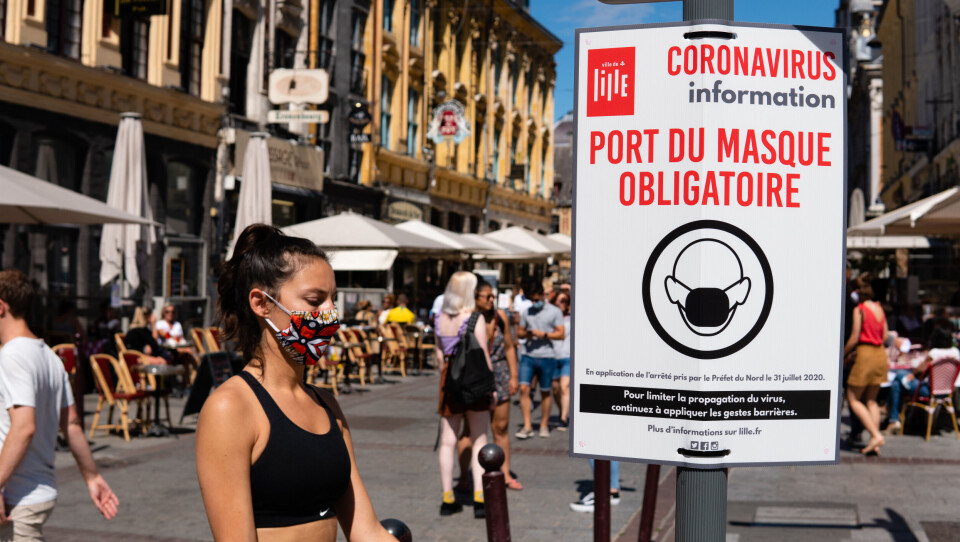-
Photos: Paris exhibition explores what people do alone at home
Behind the curtain: L’Intime Expo takes a fascinating look at people's private lives
-
Photo: what is the strange ‘hair ice’ phenomenon seen in France recently?
Extremely rare formation is occurring in eastern woodlands
-
Macron confirms what he wants to say to Trump when he visits US next week
Ukraine, EU and US relations and geopolitical situation are unsurprisingly key topics
Schéma, rétablissement: 30 Covid-related terms you may hear in France
From getting a test to showing your health pass, there are a whole host of words that have entered our vocabulary since the start of the pandemic

A year and a half into the pandemic, Covid-19 has implanted itself in our lives, along with an assortment of words and phrases that we have come to use on a daily basis.
If you are out and about in France, we have a list of some of the Covid-related terms that you might see or hear and need to understand.
Getting a test
-
Lieux de dépistage Covid-19 - This refers to the places in which you can access a Covid-19 test. A list of all of these services can be found on the DépistageCovid website.
-
Les tests virologiques - Virological testing devices for Covid-19 include PCR devices, which involve collecting a sample of respiratory material from the inside of the nose and/or throat.
-
Les tests antigéniques - This refers to antigen tests, also known as lateral flow tests, which look – as the name suggests – for antigens (proteins) on the surface of the virus. Because they can be easily detected, laboratory testing is not necessary, and so results can be provided more quickly than in the case of PCR tests.
-
Un prélèvement nasopharyngé - Translates to a nasal swab in English, and describes the process involved in taking a Covid test.
-
Les autotests nasaux - These are self-testing lateral flow kits that you can use on your own, without having to go to a pharmacy or other test centre.
-
Prendre rendez-vous - to make an appointment
-
Écouvillon - a swab
-
Se faire dépister - to take a Covid test (test de dépistage)
-
Une ordonnance - prescription
For information on Covid tests in France see:
How do I get a Covid-19 test in France to return to the UK?
Do antigen Covid tests in France meet UK standards for return travel?
Covid-19: Rules for travel to and from France
Showing your health pass
-
Justificatif d’identité - an identity card such as a driving licence. This should only be asked of you by police officers and not staff at the venues you are visiting.
-
En format numérique - in digital form. For example, you may display your health pass on the TousAntiCovid app.
-
Un schéma vaccinal complet - full vaccination. A person has a schéma vaccinal complet if they have had both doses of the Covid vaccine (or a single dose in the case of the Janssen vaccine).
-
Certificat de rétablissement - a document proving that you have had Covid and recovered. This normally takes the form of a negative PCR or antigen test taken 11 days to six months after the date you tested positive.
-
Preuve sanitaire - proof of your Covid-19 status
-
Augmenter la luminosité - while checking your health pass, a member of staff may ask you to augmenter la luminosité (‘increase the brightness level’) of your phone screen.
-
Un écran intact - a clear phone screen with no cracks. This makes it easier for staff members to scan your pass.
For information on showing your health pass in France see:
Scottish Covid jab QR codes now compatible with France’s TousAntiCovid
How to get a French health pass: A guide for residents and visitors
Other useful terms
-
Distanciation sociale - social distancing. You may also see signs saying ‘garder la distance’ (‘Please maintain a safe distance’).
-
Port du masque obligatoire - means that mask-wearing is compulsory in the establishment or space that you are in.
-
Gestes barrières - protective measures or safety precautions
-
Auto-isolement - self-isolation
-
Taux d’incidence - the infection rate. In France, this is usually measured by the number of infected people for 100,000 residents.
-
Couverture vaccinale - vaccination coverage, or the number of people who have been vaccinated against Covid.
-
Difficultés respiratoires - breathing difficulties
-
La toux - a cough
-
La fièvre - fever
-
Des courbatures - stiffness
-
La fatigue inhabituelle - abnormal levels of tiredness
-
Une perte de goût ou d’odorat - a loss of your sense of taste or smell
-
Des maux de gorge - a sore throat
-
Des maux de tête - a headache
Related articles
Improve your French: The mixed meaning of 'quarantine'
7 French expressions to use when it's hot weather






















